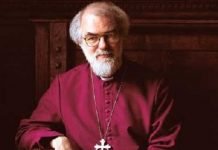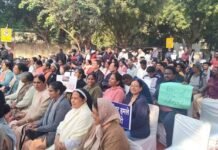The Diocese of Oxford will extend its commitment to mutual support following the success of its 2020 initiative. The diocese will allocate a further £1.5m to support the five Church of England dioceses in most financial need.
For historical reasons, coupled with outstanding management of our property portfolio, the Diocese of Oxford has a significantly higher amount of glebe land and investments than many other dioceses.
All wealth and riches come from God, belong to God and are to be used to the glory of God. Diocesan glebe land and investments make a significant contribution to the life of our churches right across the diocese, but we must demonstrate Christ-like generosity to dioceses who are in greatest financial need at the same time.
For this reason, in 2020 the Diocese of Oxford approved £1 million to be distributed to the five dioceses in receipt of Lowest Income Communities (LInC) grants and with the lowest level of Diocesan Stipend Fund (DSF) per capita over a four year period. The 2020 initiative was well received.
Three examples of 2020-2024 mutual support
Diocese of Canterbury
“We are incredibly grateful for this funding, and it has been of great value in the crucial work we undertake with refugees. It has enabled us to fund our Kent Refugee Programmes Manager who has helped us with our projects which intend to create genuine long-term social bonds and expand the social network of our community. Some of our programmes include:
Welcome Hubs for Ukrainian refugees
English language lessons and employment support
Welcome Café supporting refugees and people seeking sanctuary living in the Canterbury area
Work with schools
As part of the role, our Kent Refugee Programmes Manager is the national representative for the Church of England for Community Sponsorship, a settlement scheme aimed at placing the community at the heart of welcoming those in need of international protection. Work in this role resulted in the publishing of a document to engage churches and community sponsorship groups in the government Safe and Legal Routes Cap Consultation process for refugees resettled into the UK.”
Diocese of Liverpool
“The Diocese of Liverpool is hugely grateful for the generous support from the Diocese of Oxford. It was particularly striking that it came without restriction or preconditions. In many ways that made the award doubly significant.
We thought long and hard about how best to use the money. We have always tried to frame debates about money in our diocese around missional choice – money can either open up missional choice and opportunity or, if the money is not there, it closes them down. In that spirit we felt it right to honour the Oxford gift by opening up a new and significant area of missional opportunity.
We landed on the issue of racial justice and, in particular, how we might properly respond to the From Lament to Action report. Given Liverpool’s connection with the slave trade this is a particular issue for us. It was also an area where we had been unable to generate any significant resource from an already over-heated diocesan budget. We also recognised the possibility of scaling up resource in this area through a dedicated national church funding stream, although there was the inevitable circularity to this position. We had to have the capacity to enable us to access the money.
We therefore committed the money to fund the costs of a Racial Justice Officer for the diocese and cathedral for 5 years. We appointed an outstanding person, Jennie Taylor, who started work in August 2022. In the early days Jennie did a lot of talking and listening which she then refined into a diocesan strategy which looks at how we move from repentance to repair. This strategy was presented to the national church and we secured a grant of £196,000 to take it forward over the next 3 years. We are confident of securing further support as we develop the work further.
The support from the Diocese of Oxford, supplemented by support from the national church, will be transformational. We recognise that transformational is a significantly over-used word, but we are confident in this case that it is rightly used. We can now move at pace and scale in delivering our strategy and moving from repentance to repair in this key area. We see this both as a matter of justice and a missional opportunity. None of this would have happened without the support from the Diocese of Oxford. We are and remain enormously grateful.”
Diocese of Newcastle
“The additional funds we have received from Oxford’s generosity have been used to fund a pioneer minister within a newly established Bishop’s Mission Order (BMO) across four deprived benefices in South East Northumberland.
The Oxford funding pushed us to form a BMO to provide an additional priest. But this then unlocked a £300k grant from a local charity to fund a youth project across the BMO over three years and we have two of the three youth workers in post and they are based at a school which serves the whole area.
It has taken time to get everything up and running… but the Oxford funding essentially helped release energy into a deprived former coal mining area and has opened up opportunity for others to provide funding to boost what we are aiming to achieve through the BMO.”
Strong support from Synod
Speaking at Diocesan Synod member Revd Gillian Barrow-Jones was one of many speaking wholeheartedly in favour of the motion; “I’m especially pleased at the longevity of the relationships with the dioceses concerned and it is so heartening to hear how a small investment from us makes such a dramatic difference to the plans of other dioceses.”
A further commitment of mutual support to the least resourced dioceses for the period 2025-9 was agreed by 98% of the diocesan synod members who voted. Furthermore, the allocation is made on a ‘first fruits’ basis, committing the amount for the full five year period.
Responding, the Vice-Chair of the Oxford Diocesan Board of Finance, Julie Dziegiel, said “Our faith in Jesus Christ leads us to be generous to others, reflecting the ultimate generosity to us that He demonstrated on the cross. I am delighted that Synod has supported this motion.”
“The Diocese of Oxford has the eighth largest investment assets per capita of dioceses in the Church of England, so this is entirely right for us to do”, said the Rt Revd Dr Steven Croft, Bishop of Oxford, following Synod. “Every diocese in the Church of England is able to share some of its wealth with more deprived dioceses and we hope this move will encourage the other dioceses who can to do the same”.
21 November 2023
—-
Notes for editors
- Oxford Diocesan Synod approved the recommendation from Bishops Council to make £1.5m available for the period 2025-9 at the November Synod.
- Allocations will be made to the five dioceses judged by the Archbishops’ Council to be the dioceses in greatest need based on the latest data, and paid directly to each diocese.
- The five dioceses to receive mutual support during 2025-9 will be named in Spring 2024, when Archbishops’ Council have updated data. (Mutual support from the Diocese of Oxford for the period 2020-2024, has been £50,000 p.a. to Birmingham, Canterbury, Liverpool, Sheffield and Newcastle dioceses.)
- Definition of Glebe: Dioceses hold land and commercial properties, known as Glebe. In the Diocese of Oxford it accounts for some £5m of our annual income. However, 2017 figures show that Oxford diocese had £65 glebe assets per head of population, whereas the same figure for Liverpool diocese is 65 pence per head.



